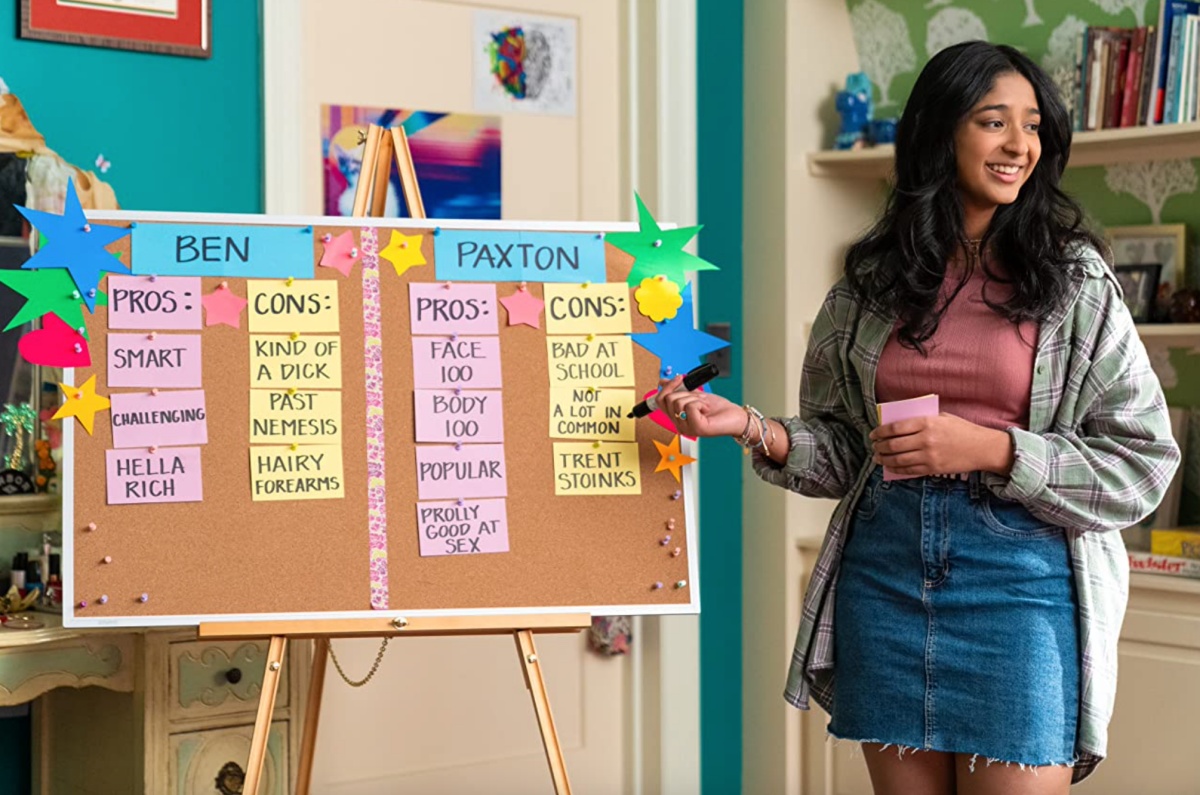Never Have I Ever‘s Devi Vishwakumar Is the Perfect Anti-Hero


Devi Vishwakumar (Maitreyi Ramakrishnan) is one of the great anti-heroines of the teen comedy-drama genre and the second season of Never Have I Ever solidified it. Season two of Never Have I Ever came out this weekend, and we were returned to the complicated world of fifteen Devi Vishwakumar, a brilliant Indian girl with a penchant for drama, anger, and not making the best choices for herself.
Spoilers for Season Two of Never Have I Ever …
Our season picks up directly after the events of the first. Devi has just scattered the ashes of her beloved father and managed to get the attention of both her longtime hot boy crush Paxton (Darren Barnet) and her academic rival, Ben (Jaren Lewison). So the perpetually single Devi finds herself with two possible love interests. But, of course, rather than making the mature decision to date only one of them, she attempts to manipulate the situation to have two boyfriends.
This blows up in her face by episode two and leaves her trying to make amends with both boys.
Never Have I Ever… is engrossing. Without meaning to, I ended up binging the entire series and being completely enthralling with the bad decisions that Devi was making. There is always this lingering knowledge that Devi knows she is making the harder choice, but she is doing it because manipulation comes more naturally than being genuine. She is always eager to apologize and will go above and beyond. Still, that never stops her from just making the right call at the beginning.
She is told that “dating” both Ben and Paxton would hurt them. Nevertheless, she still justifies her actions.
However, what I loved about this season was that on top of it just being a character flaw, they also took the time to explore the mental health issues that are a part of her behavior.
One frequently called name is “crazy Devi,” and we see her struggle with her temper and going into extreme places. Finally, after stalking her mother, making a scene, and getting called “crazy” again, Devi seeks help from her therapist, Dr. Jamie Ryan, played by Niecy Nash.
When Devi asks if Dr. Ryan thinks she is “crazy,” Dr. Ryan responds with kindness, pointing out that Devi is probably depressed and dealing with the traumatic pain of seeing her father die right in front of her. Of course, none of this excuses Devi’s actions, but I love that it highlighted that Devi is not some typical mean girl acting out. Instead, she is hurting and making bad decisions because she’s a silly teenager trying to escape a larger pain.
The arrival of a second, cooler Indian girl, Aneesa (Megan Suri), also stirs up complex feelings in Devi because, in many ways, Devi has internalized her token status. Even though she hangs out with other POC, she was the only Indian, Tamil, Hindu there. So seeing Aneesa arrive and be so effortlessly flawless and cool only makes Devi feel inadequate, which leads to her acting out.
Her accidentally spreading a rumor about Aneesa having an eating disorder (which ends up being true) leads to an arc of Devi having actually to apologize and do something altruistic to make amends.
During an interview with Suri for Yahoo she talked about stepping into the show as this cool Indian Muslim girl:
“I mean, Aneesa’s whole thing is that she’s so much more than a surface-level popular girl. She has a deeper story to tell, too. That’s what drew me. Also, seeing — not even just girls, but if we’re going to narrow it down and get more specific — cool, competent brown girls in the spotlight is something we rarely ever [experience]. So to get the honor to portray that, and a brown Muslim girl at that, I was just like “I’m so in, thank you for thinking that I was the one to be that person.” I just hope that people take away the classic rule, which is to not judge a book by its cover — there’s always something deeper underneath the surface. And just to be kind, kindness is always solid.”
I loved that aspect of the show because Aneesa, from the beginning, had Devi’s back. It was Devi’s own childish and narcissistic behavior that pushed for a rivalry that didn’t exist.
Devi is excellent to watch because sometimes when shows get so wrapped up in only giving “good” representation, they miss the chance to tell messing and engaging stories. Never Have I Ever … delivers that with Devi, her family, and all the character surrounding her. Devi gets to be the nerdy, anti-hero of her own story, and I can’t wait to see how it continues.
(image: Netflix)
Want more stories like this? Become a subscriber and support the site!
—The Mary Sue has a strict comment policy that forbids, but is not limited to, personal insults toward anyone, hate speech, and trolling.—
Have a tip we should know? [email protected]
